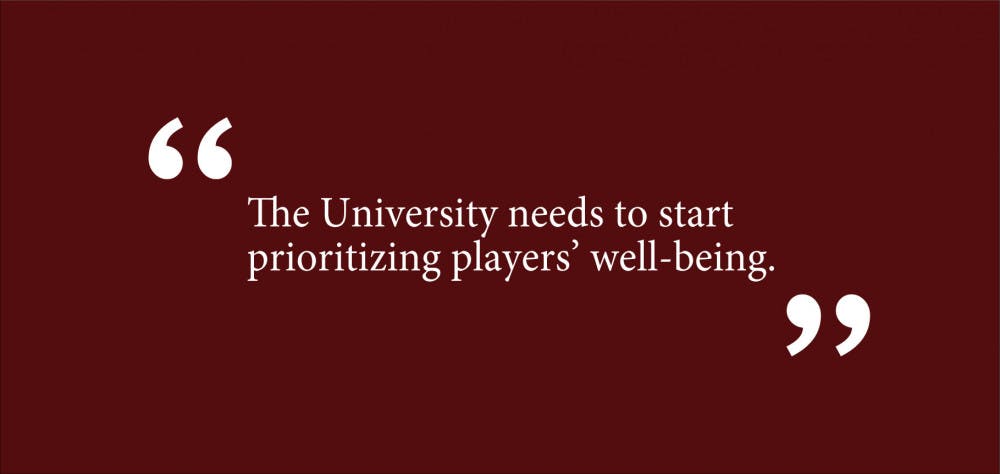On Feb. 24, The Herald reported that seven former players on the women’s basketball team alleged that their coach Sarah Behn “repeatedly made remarks about players’ weights, used language that they described as vulgar and singled out players for criticism.” The article also detailed the ways in which players and parents attempted to report this behavior to the University. Three players spoke separately to Carolan Norris, the senior associate director of athletics for student-athlete services, but felt these conversations did not make a difference. One parent submitted multiple complaints to Director of Athletics Jack Hayes; by the time the article was published, Hayes hadn’t even responded to the parent’s most recent email.
From this article, two issues become clear. First, there is no standard, well-publicized way to report coaches’ misconduct if it falls outside of Title IX. Second, the University does not appear to have a mechanism to hold coaches accountable and protect players from abusive behavior.
In an op-ed published in The Herald, Kerrissa Heffernan argued that criticism of Behn is biased, as male coaches don’t face the same scrutiny. Heffernan does not to seem to see a problem with Behn’s behavior, describing her coaching style as “direct and corrective.” But we cannot dismiss the real grievances of players, nor should we excuse Behn’s behavior as simply “direct.” The solution to potential bias shouldn’t be to let Behn off the hook. Instead, the University should hold all coaches to a higher standard.
The University needs to start prioritizing players’ well-being. To do so, it should create a well-publicized way to report misconduct and then hold coaches accountable for their behavior.
When I was a member of the women’s crew team fall 2017, we were required to attend a meeting where administrators informed us of University policy concerning hazing and Title IX rules. The Univeristy has clear policies on these issues because hazing is illegal under Rhode Island law, and because Title IX rules are informed by federal regulation. In this meeting, we learned about resources available to report hazing and Title IX violations; we also were warned about the steep consequences the University would impose if we engaged in hazing.
But we didn’t learn how to report other kinds of misconduct. For example, what mechanisms are in place for a team that is required to practice beyond the 20-hour-a-week limit mandated by NCAA rules (which I know happens at this school from my own experience and that of others)? The University also doesn’t have a well-publicized procedure to report coaches for pressuring students to train through injuries, or for using abusive or demeaning language. While I know I haven’t been actively involved on a Brown sports team in a few years, I suspect misconduct procedures have not changed.
When it comes to the coach-athlete relationship, coaches hold all the cards — the only recourse players have is to quit. But quitting a sport isn’t easy, especially when most of your friends are on the team. I know this from personal experience: Quitting the crew team was one of the hardest decisions I’ve made during my time here at Brown. The University needs to create a way to hold coaches accountable, so students aren’t forced out of the sports they love. Furthermore, the University should track the number of students who quit every sport, and potentially investigate teams where an unusually high number of students have quit.
Brown takes reports of alleged student misconduct, like hazing, very seriously. Most recently, Brown conducted a thorough investigation and ultimately suspended the men’s swimming and diving team for spring 2018, and canceled their competitions during fall 2018. But when it comes to coaches’ behavior, the University doesn’t pay much heed to students’ and parents’ concerns.
The University should strive to create a student body that is happy, healthy and ready to learn. This means ensuring Brown employees — including coaches — are treating students with respect and holding them accountable if they don’t.
Rebecca Aman ’20 can be reached at
rebecca_aman@brown.edu. Please send responses to this opinion to
letters@browndailyherald.com and op-eds to opinions@browndailyherald.com.





